Tom Waits | ||
| Allmusic Biography : In the work of American songwriter Tom Waits, swampy blues, Beat poetry, West Coast jazz, Tin Pan Alley, country, 1930s-era cabaret, and post-Civil War parlor songs meet neon-lit carnival music, and the wheezing, clattering, experimental rhythms (often played by makeshift musical instruments from car radios to metal pipes and tin cans -- hence his love of Edgard Varese and Harry Partch) form a keenly individual musical universe. It has often been imitated but never replicated. Since the 70s, Waits has charted a path from playing fleabag dive bars to opera theaters and prestigious concert halls all over the world. His recordings -- from early masterpieces such as Small Change and Blue Valentine and the twisted, dramatic, and blackly humorous artsongs on the trilogy of Swordfishtrombones, Rain Dogs, and Franks Wild Years, to the deconstructed experimental soundworlds erected for Bone Machine and Mule Variations -- have charted the lives and circumstances of the humble, forgotten, evil, demented, abandoned, cursed, and just plain down-on-their-luck humans to places of honor in our pantheon in a spirit akin to the photographs of Robert Frank and Diane Arbus. He has charted an iconoclastic path through Stephen Foster and George Gershwin, Howlin Wolf, and Captain Beefheart as well as writers from the Beat Generation, and Charles Bukowski, Nelson Algren, and Mark Twain to create a holistic body of work whose appeal criss-crosses generations and blurs pops arbitrary boundaries. Waits has won two Grammys and is a member of the 2011 class of The Rock and Roll Hall of Fame. He is included among the 2010 list of Rolling Stones 100 Greatest Singers, as well as its 2015 list of 100 Greatest Songwriters of All Time. He has composed for and acted in movies and musicals as a character actor. His list of supporting roles includes Paradise Alley, Rumblefish, The Cotton Club, The Outsiders, and Bram Stokers Dracula, to name a few. He has also appeared in a number of director Jim Jarmuschs films including a starring role in 1986s Down by Law. Waits received an Academy Award nomination for his score and soundtrack for Francis Ford Coppolas One from the Heart. Waits had heard an abundance of American songforms, from show tunes and crooners to blues and hillbilly music while growing up in San Diego during the 50s and early 60s; he was also under the sway of Border Radios golden era and exposed to everything from mariachi and banda to swing, jump blues, R&B;, honky tonk, folk, and early rock & roll. Wrapped up in music and Jack Kerouacs On the Road, he taught himself piano and guitar as a teenager and began singing on San Diegos burgeoning folk scene. He also began writing his own songs based on snatches of overheard conversation. Leaving home while still an adolescent, Waits hit the road for Los Angeles, where he lived out of his car while working as a doorman at the L.A. nightclub the Heritage. He got his performing break in 1969 at the Troubadour (and freely borrowed from jazz comedian Lord Buckleys stage persona) and eventually secured work as a songwriter before signing a recording contract with Asylum Records. Relocating to the infamous Tropicana Motor Hotel, where he made fast friends with other aspiring artists and denizens of the nighttime streets (including Chuck E. Weiss and Rickie Lee Jones), and recorded and released his Jerry Yester-produced debut album Closing Time in 1973. The album included the track "Ol 55," which was covered by the Eagles on their first album, On the Border, and it eventually became a minor hit, securing him his first steady income when the album went multi-platinum. In those early days, Waits played anywhere and everywhere he could get a gig. He opened shows for artists like Frank Zappa & the Mothers of Invention in theaters, and headlined seedy bars and long-abandoned jazz clubs from coast to coast. In 1974, Waits followed up with The Heart of Saturday Night, produced by Bones Howe. Less folky and countrified than his debut, the album was positively received by critics and sold well, entering the lower rungs of the Top 200 chart. Its title track became a regional hit for Jerry Jeff Walker. Seasoned by the road, Waits live shows had become freewheeling encounters with audiences. He not only played and sang, but told wryly humorous, sometimes outrageous, sometimes bawdy stories that self-mythologized his person and offered character sketches of strippers, circus freaks, barflies, and other streetwise neer-do-wells. These were captured on 1975s double-length classic Nighthawks at the Diner; his band included all jazzmen in drummer Jim Hughart, pianist Michael Melvoin, and saxophonist Pete Christlieb. Waits kept the rangy jazz tip for 1976s Small Change (number 89), a more melancholy, lush affair that also brought the first hints of the raw, bluesy sound that appeared on later albums. While his rhythm section included Hughart and West Coast jazz icon Shelly Manne on drums, Waits and Howe also showed off the songwriters love for ballads by adding a string section. Some of its songs, including "Tom Trauberts Blues" (aka "Waltzing Matilda") and "Step Right Up" became staples in his setlist for decades. Waits doubled down on jazz and low-key swing-blues for 1977s Foreign Affairs, whose best-known track was a duet with Bette Midler on "I Never Talk to Strangers." It hit 111 on the Top 200. While touring and playing slightly bigger rooms, Waits sought to project a more sinister sound and added an electric guitar (for the first time) to 1978s brooding, menacing Blue Valentine, that confused fans of his more laid-back style. In 1980, he issued Heartattack and Vine. Its electric blues and R&B; slant propelled it into the top half of the Top 200. It was his best-selling full-length since Small Change. The set also included the song "Jersey Girl," later covered by Bruce Springsteen. It was his final recording for Asylum. Waits jumped ship to Chris Blackwells Island Records for 1983s Swordfishtrombones. Frustrated by the limitations of standard instrumentation that he was basically forced to use, his new label encouraged his freedom. Waits established his "junkyard orchestral deviation" concept by using marimbas, trashcan lids, kettle drums, and tympani as well as bleating trombones and muted trumpets. While the shift in sonics was radical and the public didn’t initially get it (it only reached 183 on the Top 200), it has since become one of his most respected recordings. Prior to the albums issue, Waits and Crystal Gayle had been working on the music for and their appearances in One from the Heart. On set, he encountered actress and writer Kathleen Brennan for the first time. They fell in love and were married in 1983. She became his constant collaborator and co-writer. The iconic Rain Dogs followed in 1985 as Waits moved deeper into an experimental direction where his now-ubiquitous megaphone, car radios, and percussion instruments made from scrap metal carried the same place in the mix as keyboards, electric guitars, and drums while offering a host of more accessible songs including "Downtown Train" (later covered to hit status by Rod Stewart, who cribbed the idea for his version from a conversation with Bob Seger, whod later cut "Blind Love"). Waits tunes have since provided Marianne Faithfull, Dion, and others with material. His profile in the world had risen. He was able to secure all-star sidemen including guitarists Marc Ribot, Chris Spedding, and Keith Richards, bassists Larry Taylor and Greg Cohen, percussionists Michael Blair and Bobby Previte, and saxophonist Ralph Carney. In addition to the army of percussion instruments, Waits began using a pump organ in earnest, as evidenced by the Brennan song "Hang Down Your Head." Despite its relative accessibility and return to formal song forms, the album only reached 185. Franks Wild Years fared far better. Released in 1987, it was Waits ninth album and subtitled "Un Operachi Romantico in Two Acts." Waits and Brennan co-wrote most of the songs for a play of the same name which premiered the year before with the two principals and Steppenwolf Theatre Company. The album peaked at 115 on the albums charts. Waits undertook a tour documented by the album Big Time, and his fortunes turned for good. The experimentation of the trilogy had brought his music to post-punk and indie rock audiences. Waits pushed his own envelope with the rattling, clattering Bone Machine in 1992. winning his first Grammy as Best Alternative Music album even though the album appeared near the bottom of the Top 200. It was a banner year for the songwriter. He appeared on saxophonist Teddy Edwards album Mississippi Lad that year and released his score for Jarmuschs film Night on Earth. He and Brennan next collaborated with writer William S. Burroughs and director Robert Wilson on The Black Rider, a dark, thematically connected series of vanguard cabaret songs deeply influenced by 30s Weimar-era Berlin. Despite critics complaints about its radical, unrelenting bleakness and noisy soundscapes, it reached number 130 on the charts. Waits made a poignant guest appearance on British composer Gavin Bryars Jesus Blood Never Failed Me Yet, a left-field hit in the U.K. in 1994. The song appeared twice. The other version was Bryars orchestration of a found field recording by a homeless man in London. Waits had attained the kind of artistic freedom he sought with Island, but also wanted more freedom in his business dealings. To that end, he signed to indie label Epitaph/Anti in 1999 and released the now-classic Mule Variations. It sold better than any of his previous recordings and hit number 24 on the Top 200. In the aftermath of his first international tour in more than a decade, he won another Grammy, this time for Best Contemporary folk album. Around the same time, Waits and Brennan worked with Wilson again on a Czech adaptation of Woyzeck. The team of Waits/Brennan/Wilson worked on two other theater works -- Blood Money and Alice (based on Alice in Wonderland), that reflected a more introspective side of Waits music-making persona in that both were rife with ballads. Waits recorded both scores and released them on the same day in 2002. The critical reaction was mixed, but fans didnt care. They respectively reached 32 and 33 on the album charts during the same week. While Waits played select shows and entertained commissions from all over the globe, he and Brennan were in retreat in their home studio working for the better part of four years on Real Gone. Released in 2006, the set featured a smaller cast of familiar faces including Les Claypool, Taylor, Ribot, and son Casey Waits on drums and percussion. The set sold well and reached 28 on the Top 200. Two years later, Waits released the mammoth limited-edition, three-disc collection Orphans: Brawlers, Bawlers & Bastards. Comprised of 26 rare and 30 previously unissued songs, Waits explained it thusly: "Some are from films, some from compilations. Some is stuff that didnt fit on a record, things I recorded in the garage with kids. Oddball things, orphaned tunes." The acclaim for this sprawling set was universal. It hit number 74 on the albums chart, and was nominated for a Grammy for best Contemporary Folk Album. Waits and Brennan once more took to the road across the United States, Canada, and Europe. In 2009, Glitter and Doom, the live document from the run, arrived and reached number 63. Two years later, Waits issued Bad as Me, his first set of all-new original material since Orphans. It was his highest-charting album ever, reaching number six on the Top 200 and chosen as one of the best albums of the year by critics across the web and in print. Bad as Me was also nominated for a Grammy for Best Alternative Music Album. Waits spent the next few years remastering and reissuing his first six Elektra/Asylum albums: Closing Time, The Heart of Saturday Night, Nighthawks at the Diner, Small Change, Foreign Affairs, Blue Valentine, and Heart Attack and Vine. Likewise, the three individual volumes in Orphans (Brawlers, Bawlers, and Bastards) were re-released. Waits also resumed his acting career in David Lowerys feature film The Old Man and the Gun, co-starring Robert Redford (in his final picture), Sissy Spacek, and Danny Glover. In 2018, Waits appeared as one of several guest vocalists on Ribots political album, Songs of Resistance 1942-1918. (Others included Steve Earle, Meshell Ndegeocello, Justin Vivian Bond, and others) that benefitted The Indivisible Project, an organization that helps individuals resist President Donald J. Trumps agenda via grassroots movements in their local communities. | ||
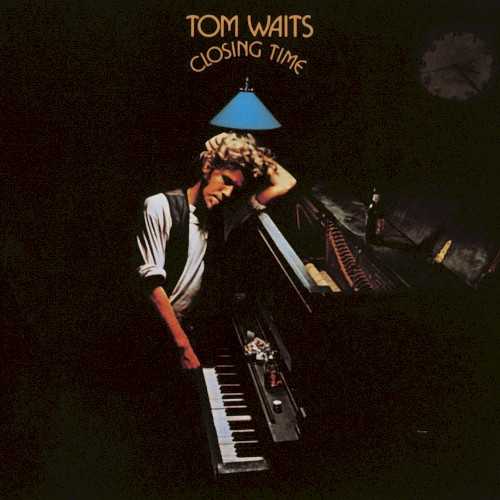 | Album: 1 of 28 Title: Closing Time Released: 1973-05 Tracks: 12 Duration: 46:14 Scroll: Up Down Top Bottom 25% 50% 75% Spotify Wikipedia Allmusic AlbumCover | 1 Ol’ ’55 (03:59) 2 I Hope That I Don’t Fall in Love With You (03:56) 3 Virginia Avenue (03:12) 4 Old Shoes (& Picture Postcards) (03:42) 5 Midnight Lullaby (03:28) 6 Martha (04:32) 7 Rosie (04:05) 8 Lonely (03:14) 9 Ice Cream Man (03:07) 10 Little Trip to Heaven (on the Wings of Your Love) (03:40) 11 Grapefruit Moon (04:52) 12 Closing Time (04:20) |
| Closing Time : Allmusic album Review : Tom Waits debut album is a minor-key masterpiece filled with songs of late-night loneliness. Within his chosen narrow range of the cocktail bar pianistics and muttered vocals, Waits and producer Jerry Yester manage to deliver a surprisingly broad collection of styles, from the jazzy "Virginia Avenue" to the uptempo off-kilter funkiness of "Ice Cream Man." The acoustic guitar folkiness of the tender "I Hope That I Dont Fall in Love with You" is an upside-down take on the Laurel Canyon sound, while the saloon song "Midnight Lullaby" would have been a perfect addition to the repertoires of Frank Sinatra and/or Tony Bennett. Waits entire musical approach is highly stylized and, in its lesser moments, somewhat derivative of some of his own heroes: "Lonely" borrows from Randy Newmans "I Think Its Going to Rain Today." His lovelorn lyrics can be sentimental without penetrating too deeply, but they still get the job done since these are song portraits in miniature. The frameworks of most of the songs come from the songwriters literary obsessions with Charles Bukowski and Jack Kerouac. Waits also has a gift for gentle, rolling pop melodies; his original scenarios are strikingly visual on the best songs, such as "Martha" -- which Yester discreetly augments with strings -- and the now iconic "Ol 55." Waits original version is far superior in conveying the early-morning emotions after leaving a lovers room to the Eagles hooky hit cover -- which ultimately guaranteed Waits an income for life. Closing Time quietly announces the arrival of a talented songwriter whose self-consciousness, wry barroom humor, and solitary melancholy made him a standout from virtually all of his peers, and difficult to pigeonhole. | ||
 | Album: 2 of 28 Title: The Heart of Saturday Night Released: 1974 Tracks: 11 Duration: 41:34 Scroll: Up Down Top Bottom 25% 50% 75% Spotify Wikipedia Allmusic AlbumCover | 1 New Coat of Paint (03:23) 2 San Diego Serenade (03:30) 3 Semi Suite (03:29) 4 Shiver Me Timbers (04:26) 5 Diamonds on My Windshield (03:12) 6 (Looking for) The Heart of Saturday Night (03:53) 7 Fumblin’ With the Blues (03:02) 8 Please Call Me, Baby (04:25) 9 Depot, Depot (03:46) 10 Drunk on the Moon (05:06) 11 The Ghosts of Saturday Night (After Hours at Napoleone’s Pizza House) (03:16) |
| The Heart of Saturday Night : Allmusic album Review : If Closing Time, Tom Waits debut album, consisted of love songs set in a late-night world of bars and neon signs, its follow-up, The Heart of Saturday Night, largely dispenses with the romance in favor of poetic depictions of the same setting. On "Diamonds on My Windshield" and "The Ghosts of Saturday Night," Waits doesnt even sing, instead reciting his verse rhythmically against bass and drums like a Beat hipster. Musically, the album contains the same mixture of folk, blues, and jazz as its predecessor, with producer Bones Howe occasionally bringing in an orchestra to underscore the loping melodies. Waits songs are sometimes sketchier in addition to being more impersonal, but "(Looking For) The Heart of Saturday Night" and "Semi Suite" are the equal of anything on Closing Time. Still, with lines such as "...the clouds are like headlines/Upon a new front page sky" and references to "a 24-hour moon" and "champagne stars," Waits imagery is beginning to get florid, and in material this stylized, the danger of self-parody is always present. | ||
 | Album: 3 of 28 Title: Nighthawks at the Diner Released: 1975 Tracks: 18 Duration: 1:13:54 Scroll: Up Down Top Bottom 25% 50% 75% Spotify Wikipedia Allmusic AlbumCover | 1 [opening intro] (02:57) 2 Emotional Weather Report (03:47) 3 [intro] (02:16) 4 On a Foggy Night (03:48) 5 [intro] (01:53) 6 Eggs and Sausage (In a Cadillac With Susan Michelson) (04:19) 7 [intro] (03:02) 8 Better Off Without a Wife (03:59) 9 Nighthawk Postcards (From Easy Street) (11:29) 10 [intro] (00:56) 11 Warm Beer and Cold Women (05:21) 12 [intro] (00:47) 13 Putnam County (07:35) 14 Spare Parts I (A Nocturnal Emission) (06:25) 15 Nobody (02:50) 16 [intro] (00:41) 17 Big Joe and Phantom 309 (06:28) 18 Spare Parts II and Closing (05:13) |
| Nighthawks at the Diner : Allmusic album Review : Tom Waits first two albums, 1973s Closing Time and 1974s The Heart of Saturday Night, documented his estimable strengths as a songwriter, but they didnt always give much of a sense of the personality that came through in his live performances. In front of an audience, Waits transformed himself into something resembling a minor character from a Jack Kerouac novel, a witty but bedraggled hipster from the seedy side of Los Angeles. His third album, 1975s Nighthawks at the Diner, was designed to show off Waits as an entertainer as well as a tunesmith; producer Bones Howe set up a nightclub facsimile in a recording studio, paired Waits with a solid band of jazz-inclined studio musicians, brought in an audience, and recorded what was in essence his first live album. As entertainment, Nighthawks at the Diner is one of Waits most thoroughly enjoyable albums. Hes clearly jazzed by the presence of an audience, and his skills as a storyteller are marvelous. Much like Lou Reeds Live: Take No Prisoners, this is an album where the between-song patter sometimes outshines the songs, and theres no arguing that Waits is a very funny guy who plays brilliantly to a crowd, spinning eccentric, evocative tales of life on the bad side of town that make it all sound like a ball. The band is excellent, too; bassist Jim Hughart, drummer Bill Goodwin, pianist Mike Melvoin, and sax player Pete Christlieb give Waits the ideal three-a.m. ambience to bring the songs to life. If Nighthawks at the Diner has a flaw, its that Waits beatnik spiel sometimes overwhelms the music, and a number of the "songs" are more spoken word routines than anything else. But "Better Off Without a Wife" and "Nobody" show he hadnt lost the ability to write a memorable song, sing it all the way through, and make it connect. And if this plays more like a "show" than a "concert," its a show youd gladly pay to hear more than once. Nighthawks at the Diner is a must for Tom Waits fans, and while beginners might not get as strong a sense of his music as they would from many of his other albums, its hard to imagine anyone not being charmed by it. | ||
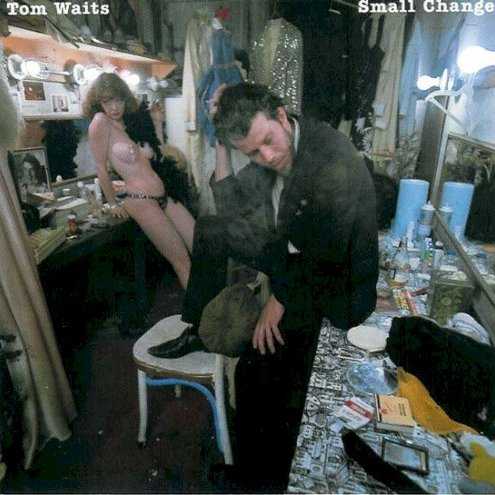 | Album: 4 of 28 Title: Small Change Released: 1976-10 Tracks: 11 Duration: 50:00 Scroll: Up Down Top Bottom 25% 50% 75% Spotify Wikipedia Allmusic AlbumCover | 1 Tom Traubert’s Blues (Four Sheets to the Wind in Copenhagen) (06:39) 2 Step Right Up (05:43) 3 Jitterbug Boy (Sharing a Curbstone With Chuck E. Weiss, Robert Marchese, Paul Body and the Mug and Artie) (03:44) 4 I Wish I Was in New Orleans (in the Ninth Ward) (04:53) 5 The Piano Has Been Drinking (Not Me) (An Evening With Pete King) (03:40) 6 Invitation to the Blues (05:24) 7 Pasties and a G‐String (at the Two O’Clock Club) (02:32) 8 Bad Liver and a Broken Heart (in Lowell) (04:50) 9 The One That Got Away (04:07) 10 Small Change (Got Rained On With His Own .38) (05:07) 11 I Can’t Wait to Get Off Work (and See My Baby on Montgomery Avenue) (03:17) |
| Small Change : Allmusic album Review : The fourth release in Tom Waits series of skid row travelogues, Small Change proves to be the archetypal album of his 70s work. A jazz trio comprising tenor sax player Lew Tabackin, bassist Jim Hughart, and drummer Shelly Manne, plus an occasional string section, back Waits and his piano on songs steeped in whiskey and atmosphere in which he alternately sings in his broken-beaned drunks voice (now deeper and overtly influenced by Louis Armstrong) and recites jazzy poetry. Its as if Waits were determined to combine the Humphrey Bogart and Dooley Wilson characters from Casablanca with a dash of On the Roads Dean Moriarty to illuminate a dark world of bars and all-night diners. Of course, hed been in that world before, but in songs like "The Piano Has Been Drinking" and "Bad Liver and a Broken Heart," Waits gives it its clearest expression. Small Change isnt his best album. Like most of the albums Waits made in the 70s, its uneven, probably because he was putting out one a year and didnt have time to come up with enough first-rate material. But it is the most obvious and characteristic of his albums for Asylum Records. If you like it, you also will like the ones before and after; otherwise, youre not Tom Waits kind of listener. | ||
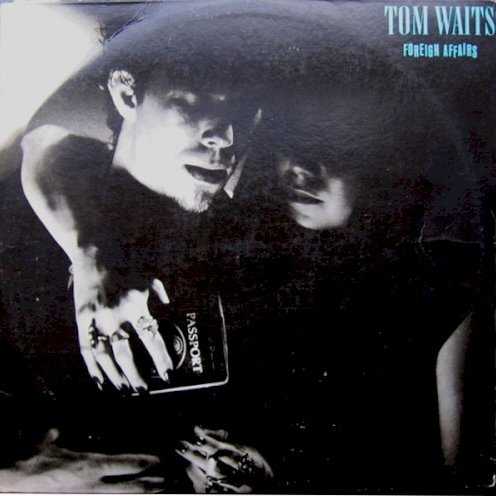 | Album: 5 of 28 Title: Foreign Affairs Released: 1977-09 Tracks: 9 Duration: 42:06 Scroll: Up Down Top Bottom 25% 50% 75% Spotify Allmusic AlbumCover | 1 Cinny’s Waltz (02:17) 2 Muriel (03:33) 3 I Never Talk to Strangers (03:38) 4 Medley: Jack & Neal / California, Here I Come (05:01) 5 A Sight for Sore Eyes (04:40) 6 Potter’s Field (08:40) 7 Burma‐Shave (06:33) 8 Barber Shop (03:54) 9 Foreign Affair (03:46) |
| Foreign Affairs : Allmusic album Review : Tom Waits fifth album for Asylum foreshadowed changes that would alter his career over the next six years. It signals a musical restlessness that fueled his next two records (Blue Valentine and Heartattack and Vine), and resulted in his writing a film score and leaving the label for Island, where he was given greater artistic control. He leans less on comic relief here and more on fully formed story songs. The album contains more ballads than most of his records do, but they were the most effective vehicles for the kind of storytelling he was trying to get to. The song "Perfect Strangers" inspired director Francis Ford Coppola to shape the characters for his film One from the Heart (he also convinced Waits to score it, leading to Waits iconic collaboration with Crystal Gayle). Produced and engineered by Bones Howe, Foreign Affairs was recorded live in studio by a quintet that included West Coast jazzmen Jack Sheldon on trumpet, saxophonist Frank Vicari, bassist Jim Hughart, and drummer Shelly Manne. Further accompaniment was provided by an orchestra arranged and conducted by Bob Alcivar. Introduced by the instrumental "Cindys Waltz," which sounds like a cinematic cue, its followed by the bluesy, alone-on-a-Saturday-night longing expressed in "Muriel." The aforementioned "Perfect Strangers" is a duet with Bette Midler. It offers a lyric dialogue between two beleaguered veterans who find themselves (again) the last patrons in a bar at closing time. Their clever, direct exchange is sweetened by smoky tenor sax flourishes, swelling strings, and brushed snares behind Waits piano. He doesnt discard his Beat Generation influences, though. Check the fingerpopping swinging medley of his "Jack & Neal," with Al Jolsons "California, Here I Come" as a travel guide to a gone-daddy-gone road trip. The ghost traces of "Tom Trauberts Blues (Four Sheets to the Wind in Copenhagen)" are heard in a borrowed melody from a saloon waltz with a cupful of bittersweet nostalgia in the lovely "A Sight for Sore Eyes." The lengthy "Potters Field" checks the harmonic charts of Richard Rodgers theme for Slaughter on Tenth Avenue and Gershwins "Rhapsody in Blue" (with Gene Ciprianos clarinet) before digging deep into sparse, noirish, blues-jazz. Its lyric is as dark and dramatic as "Small Change (Got Rained on with His Own 38)," creating a narrative worthy of a Sam Fuller film. "Burma Shave" is a solo piano and vocal paean to the memories of drives Waits took with his father through lifes seedy side. While the funky blues-cum-rhumba in "Barber Shop" adds swagger and pop to Waits post-beat lyricism, the closing title track returns to the ballad to offer a bittersweet meditation on the perspective of "home": What it represents in the heart as opposed to what it actually is -- all from a guy living at the Tropicana Motor Hotel. Foreign Affairs is one of the most unjustifiably overlooked titles in Waits catalog. It holds its appeal -- and sounds less dated -- than many of his more popular entries. | ||
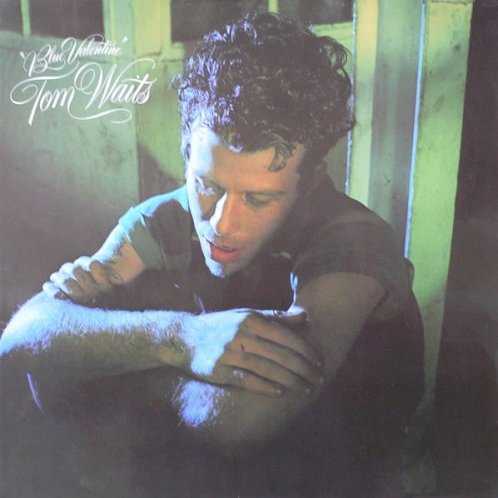 | Album: 6 of 28 Title: Blue Valentine Released: 1978-10 Tracks: 10 Duration: 49:36 Scroll: Up Down Top Bottom 25% 50% 75% Spotify TrackSamples Wikipedia Allmusic AlbumCover | 1 Somewhere (From “West Side Story”) (03:53) 2 Red Shoes by the Drugstore (03:14) 3 Christmas Card From a Hooker in Minneapolis (04:33) 4 Romeo Is Bleeding (04:52) 5 $29.00 (08:15) 6 Wrong Side of the Road (05:14) 7 Whistlin’ Past the Graveyard (03:17) 8 Kentucky Avenue (04:49) 9 A Sweet Little Bullet From a Pretty Blue Gun (05:36) 10 Blue Valentines (05:50) |
| Blue Valentine : Allmusic album Review : Two welcome changes in style made Blue Valentine a fresh listening experience for Tom Waits fans. First, Waits alters the instrumentation, bringing in electric guitar and keyboards and largely dispensing with the strings for a more blues-oriented, hard-edged sound. Second, though his world view remains fixed on the lowlifes of the late night, he expands beyond the musings of the barstool philosopher who previously had acted as the first-person character of most of his songs. When Waits does use the first-person, its to write a "Christmas Card From a Hooker in Minneapolis," not the figure most listeners had associated with the singer himself. The result is a broadening of subject matter, a narrative discipline that makes most of the tunes story songs, and a coherent framing for Waits typically colorful and intriguing imagery. These are not radical reinventions, but Waits had followed such a rigidly stylized approach on his previous albums that for anyone who had followed him so far, the course correction was big news. | ||
 | Album: 7 of 28 Title: Heartattack and Vine Released: 1980-09 Tracks: 9 Duration: 44:30 Scroll: Up Down Top Bottom 25% 50% 75% Spotify Allmusic Wikipedia AlbumCover | 1 Heartattack and Vine (04:50) 2 In Shades (04:25) 3 Saving All My Love for You (03:41) 4 Downtown (04:45) 5 Jersey Girl (05:11) 6 ’Til the Money Runs Out (04:25) 7 On the Nickel (06:19) 8 Mr. Siegal (05:14) 9 Ruby’s Arms (05:35) |
| Heartattack and Vine : Allmusic album Review : Heartattack and Vine is Tom Waits seventh and final album for Asylum. As such, its transitional. As demonstrated by its immediate predecessors, 1978s excellent Blue Valentine and 1977s Foreign Affairs, he was already messing with off-kilter rhythms even in the most conventionally structured blues and jazz songs, with nastier-sounding guitars -- he plays a particularly gnarly style of rhythm on this entire album. Five of these nine tracks are rooted in gutbucket blues with rock edges and primal R&B; beats. By this time, his singing voice had deteriorated to a gasping-for-breath whiskey-and-cigarettes growl that could make words indecipherable from one another, but his jazzman-inspired phrasing more than compensated. Check the opening title track with its razored electric guitars (Roland Bautista guested on lead over several cuts), Greg Cohens walking upright bass and natural sound, Victor Feldmans percussion shuffle, and Plas Johnsons tenor sax that makes Waits vocal grimace and growl even more menacing. The tune details substance abuse, denizens of lifes dark side, and a view of God and the Devil as sober and drunk sides of the same person. Ronnie Barrons Hammond B-3 figures prominently on the low, slow blues instrumental "In Shades," which sets up the first of a series of memorable ballads. "Saving All My Love for You" could have appeared on Foreign Affairs, as Waits piano and a string chart by Jerry Yester frame a scenic, confessional, broken love song. "Downtown" adds funk to the blues, with Barrons organ in direct confrontation with distorted electric guitars and Waits declarative guttural snarl. It sets up "Jersey Girl," a dramatic ballad that overlaps with the sound world of Bruce Springsteen so much -- complete with glockenspiel -- that the Boss covered it, released it as a live B-side, and made it a part of his live sets for decades. But theres a difference too: Waits also pays direct, unmasked homage to the Drifters in its dynamic chorus structure and lush use of strings. "On the Nickel" is another of Waits more arresting ballads evoking an earlier and grittier era in American life and culture. It was used as the title track of Ralph Waites film of the same name -- Waits scored the entire film. With its swaggering stride piano and guitar and NOLA-inspired R&B;, "Mr. Siegal" is a gangsters boast that rivals the hip poetry of Lord Buckley. The near baroque woodwind and reed chart that introduces album finale "Rubys Arms" marks one of Waits most beautiful and unusual ballads. Yesters use of strings as a frame for his singing is sparse and roomy, allowing the songwriters piano to accompany his achingly sad vocal with all the poignancy, regret, and resolve that only the romantically bereft can muster. In sum, Heartattack and Vine reveals just how much Waits had grown during his tenure with Asylum. Though not perfect in sequencing -- the alternating juxtaposition of rowdy blues and heartworn ballads gets old -- almost every song stands on its own as a dusty gem. | ||
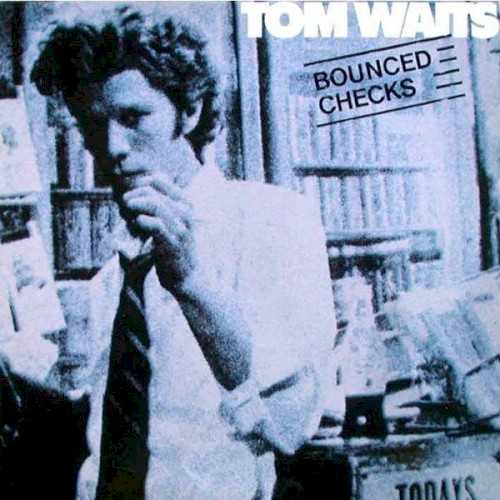 | Album: 8 of 28 Title: Bounced Checks Released: 1981 Tracks: 10 Duration: 45:53 Scroll: Up Down Top Bottom 25% 50% 75% Allmusic AlbumCover | 1 Heartattack and Vine (04:50) 2 Jersey Girl (04:35) 3 Eggs and Sausage (04:14) 4 I Never Talk to Strangers (03:38) 5 The Piano Has Been Drinking (live) (06:04) 6 Whistlin Past the Graveyard (03:00) 7 Mr. Henry (03:30) 8 Diamonds on My Windshield (03:12) 9 Burma-shave (06:28) 10 Tom Trauberts Blues (06:21) |
| Bounced Checks : Allmusic album Review : As a first stab at assembling a compilation of Tom Waits tenure at Asylum Records, the U.K.-only Bounced Checks is a reasonable effort, though its far from what could be done with the catalog. Apparently put together by the artist and his manager, which may help explain the absence of anything from the first album, Closing Time, it is a ten-track disc, four tracks of which are previously unreleased. There are alternate masters of "Jersey Girl" and "Whistlin Past the Graveyard," a live performance of "The Piano Has Been Drinking," and "Mr. Henry," a leftover from the Heartattack and Vine sessions. Some of Waits best is here. You cant argue with selections like "Tom Trauberts Blues" or the Bette Midler duet "I Never Talk to Strangers." But where are favorites like "Ol 55" and "(Looking For) The Heart of Saturday Night"? Its probably not possible to do Waits seven Asylum LPs justice on a single ten-track disc. But Bounced Checks is more to be sought out by hardcore Waits fans who want to own the rarities than neophytes who are looking for a best-of. | ||
 | Album: 9 of 28 Title: Swordfishtrombones Released: 1983 Tracks: 15 Duration: 41:46 Scroll: Up Down Top Bottom 25% 50% 75% Spotify Wikipedia Allmusic AlbumCover | 1 Underground (02:01) 2 Shore Leave (04:18) 3 Dave the Butcher (02:20) 4 Johnsburg, Illinois (01:33) 5 16 Shells From a Thirty-Ought-Six (04:33) 6 Town With No Cheer (04:28) 7 In the Neighborhood (03:07) 8 Just Another Sucker on the Vine (01:46) 9 Franks Wild Years (01:53) 10 Swordfishtrombone (03:08) 11 Down, Down, Down (02:16) 12 Soldiers Things (03:23) 13 Gin Soaked Boy (02:24) 14 Troubles Braids (01:18) 15 Rainbirds (03:15) |
| Swordfishtrombones : Allmusic album Review : Between the release of Heartattack and Vine in 1980 and Swordfishtrombones in 1983, Tom Waits got rid of his manager, his producer, and his record company. And he drastically altered a musical approach that had become as dependable as it was unexciting. Swordfishtrombones has none of the strings and much less of the piano work that Waits previous albums had employed; instead, the dominant sounds on the record were low-pitched horns, bass instruments, and percussion, set in spare, close-miked arrangements (most of them by Waits) that sometimes were better described as "soundscapes." Lyrically, Waits tales of the drunken and the lovelorn have been replaced by surreal accounts of people who burned down their homes and of Australian towns bypassed by the railroad -- a world (not just a neighborhood) of misfits now have his attention. The music can be primitive, moving to odd time signatures, while Waits alternately howls and wheezes in his gravelly bass voice. He seems to have moved on from Hoagy Carmichael and Louis Armstrong to Kurt Weill and Howlin Wolf (as impersonated by Captain Beefheart). Waits seems to have had trouble interesting a record label in the album, which was cut 13 months before it was released, but when it appeared, rock critics predictably raved: after all, it sounded weird and it didnt have a chance of selling. Actually, it did make the bottom of the best-seller charts, like most of Waits albums, and now that he was with a label based in Europe, even charted there. Artistically, Swordfishtrombones marked an evolution of which Waits had not seemed capable (though there were hints of this sound on his last two Asylum albums), and in career terms it reinvented him. | ||
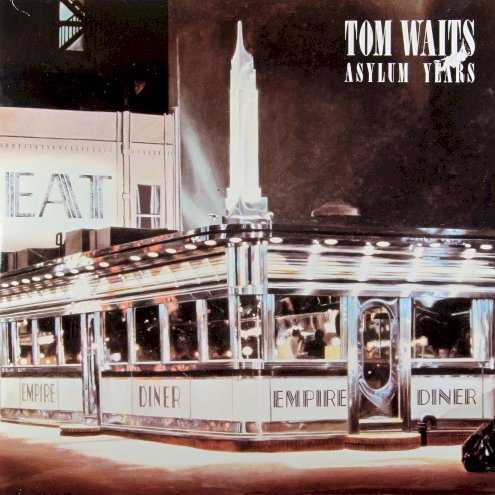 | Album: 10 of 28 Title: Asylum Years Released: 1984 Tracks: 20 Duration: 1:27:47 Scroll: Up Down Top Bottom 25% 50% 75% Spotify AlbumCover | 1 Ol 55 (03:47) 2 Martha (04:12) 3 Rosie (03:46) 4 Shiver Me Timbers (04:11) 5 San Diego Serenade (03:13) 6 Diamonds on My Windshield (03:01) 7 (Looking for) The Heart of Saturday Night (03:41) 8 The Ghosts of Saturday Night 8after Hours at Napoleones Pizza House) (03:01) 9 Small Change (04:48) 10 Tom Trauberts Blues (06:02) 1 Step Right Up (05:16) 2 Burma Shave (06:07) 3 Foreign Affair (02:31) 4 Mr. Henry (03:13) 5 The Piano Has Been Drinking (03:20) 6 Potters Field (08:03) 7 Kentucky Avenue (04:27) 8 Somewhere (From West Side Story) (03:33) 9 On the Nickel (06:05) 10 Rubys Arms (05:30) |
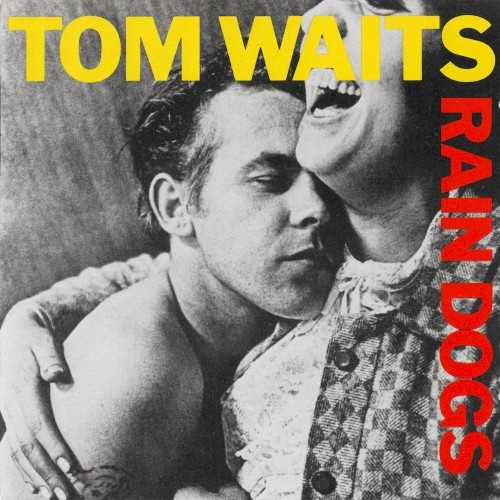 | Album: 11 of 28 Title: Rain Dogs Released: 1985 Tracks: 19 Duration: 54:04 Scroll: Up Down Top Bottom 25% 50% 75% Spotify Wikipedia Allmusic AlbumCover | 1 Singapore (02:45) 2 Clap Hands (03:48) 3 Cemetery Polka (01:46) 4 Jockey Full of Bourbon (02:47) 5 Tango Till They’re Sore (02:51) 6 Big Black Mariah (02:43) 7 Diamonds & Gold (02:32) 8 Hang Down Your Head (02:33) 9 Time (03:56) 10 Rain Dogs (02:57) 11 Midtown (instrumental) (01:03) 12 9th & Hennepin (01:56) 13 Gun Street Girl (04:37) 14 Union Square (02:24) 15 Blind Love (04:20) 16 Walking Spanish (03:07) 17 Downtown Train (03:53) 18 Bride of Rain Dog (instrumental) (01:09) 19 Anywhere I Lay My Head (02:47) |
| Rain Dogs : Allmusic album Review : With its jarring rhythms and unusual instrumentation -- marimba, accordion, various percussion -- as well as its frequently surreal lyrics, Rain Dogs is very much a follow-up to Swordfishtrombones, which is to say that it sounds for the most part like The Threepenny Opera being sung by Howlin Wolf. The chief musical difference is the introduction of guitarist Marc Ribot, who adds his noisy leads to the general cacophony. But Rain Dogs is sprawling where its predecessor had been focused: Tom Waits lyrics here sometimes are imaginative to the point of obscurity, seemingly chosen to fit the rhythms rather than for sense. In the course of 19 tracks and 54 minutes, Waits sometimes goes back to the more conventional music of his earlier records, which seems like a retreat, though such tracks as the catchy "Hang Down Your Head," "Time," and especially "Downtown Train" (frequently covered and finally turned into a Top Ten hit by Rod Stewart five years later) provide some relief as well as variety. Rain Dogs cant surprise as Swordfishtrombones had, and in his attempt to continue in the direction suggested by that album, Waits occasionally borders on the chaotic (which may only be to say that, like most of his records, this one is uneven). But much of the music matches the earlier album, and there is so much of it that that is enough to qualify Rain Dogs as one of Waits better albums. | ||
 | Album: 12 of 28 Title: Franks Wild Years Released: 1987-08-17 Tracks: 17 Duration: 56:45 Scroll: Up Down Top Bottom 25% 50% 75% Spotify TrackSamples Allmusic Wikipedia AlbumCover | 1 Hang on St. Christopher (02:46) 2 Straight to the Top (Rhumba) (02:30) 3 Blow Wind Blow (03:34) 4 Temptation (03:53) 5 Innocent When You Dream (Barroom) (04:15) 6 I’ll Be Gone (03:12) 7 Yesterday Is Here (02:31) 8 Please Wake Me Up (03:35) 9 Franks Theme (01:50) 10 More Than Rain (03:52) 11 Way Down in the Hole (03:30) 12 Straight to the Top (Vegas) (03:24) 13 I’ll Take New York (04:00) 14 Telephone Call From Istanbul (03:12) 15 Cold Cold Ground (04:07) 16 Train Song (03:20) 17 Innocent When You Dream (78) (03:08) |
| Franks Wild Years : Allmusic album Review : Tom Waits wrote a song called "Franks Wild Years" for his 1983 Swordfishtrombones album, then used the title (minus its apostrophe) for a musical play he wrote with his wife, Kathleen Brennan, and toured with in 1986. The Franks Wild Years album, drawn from the show, is subtitled, "un operachi romantico in two acts," though the songs themselves do not carry the plot. Rather, this is just the third installment in Waits eccentric series of Island Records albums in which he seems most inspired by German art song and carnival music, presenting songs in spare, stripped-down arrangements consisting of instruments like marimba, baritone horn, and pump organ and singing in a strained voice that has been artificially compressed and distorted. The songs themselves often are conventional romantic vignettes, or would be minus the oddities of instrumentation, arrangement, and performance. For example, "Innocent When You Dream," a song of disappointment in love and friendship, has a winning melody, but it is played in a seesaw arrangement of pump organ, bass, violin, and piano, and Waits sings it like an enraged drunk. (He points out the arbitrary nature of the arrangements by repeating "Straight to the Top," done as a demented rhumba in act one, as a Vegas-style Frank Sinatra swing tune in act two.) The result on record may not be theatrical, exactly, but it certainly is affected. It also has the quality of an inside joke that listeners are not being let in on. | ||
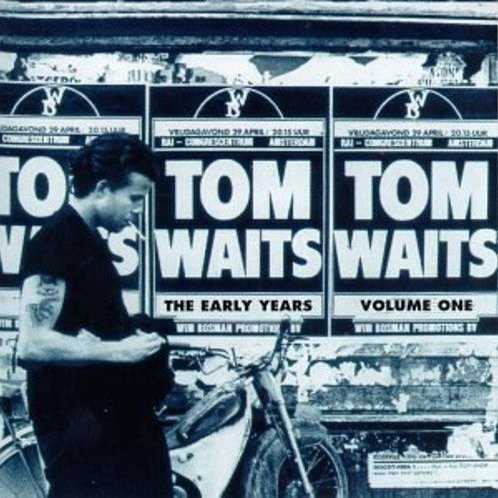 | Album: 13 of 28 Title: The Early Years, Volume 1 Released: 1991-07-16 Tracks: 13 Duration: 43:38 Scroll: Up Down Top Bottom 25% 50% 75% Wikipedia AlbumCover | 1 Goin Down Slow (02:48) 2 Ponchos Lament (04:17) 3 Im Your Late Night Evening Prostitute (03:16) 4 Had Me a Girl (05:32) 5 Ice Cream Man (03:11) 6 Rockin Chair (03:15) 7 Virginia Ave. (02:41) 8 Midnight Lullabye (03:37) 9 When You Aint Got Nobody (03:24) 10 Little Trip to Heaven (03:02) 11 Franks Song (01:56) 12 Looks Like Im Up Shit Creek Again (03:03) 13 So Long Ill See Ya (03:31) |
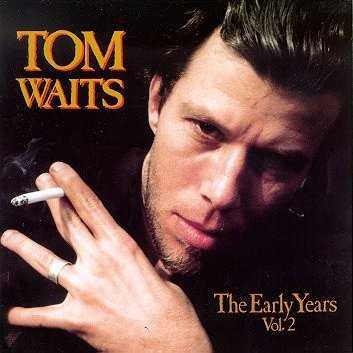 | Album: 14 of 28 Title: The Early Years, Volume 2 Released: 1992 Tracks: 13 Duration: 44:16 Scroll: Up Down Top Bottom 25% 50% 75% Wikipedia AlbumCover | 1 Hope I Dont Fall in Love With You (05:01) 2 Ol 55 (04:07) 3 Mockin Bird (03:27) 4 In Between Love (03:01) 5 Blue Skies (02:13) 6 Nobody (02:47) 7 I Want You (01:22) 8 Shiver Me Timbers (03:48) 9 Grapefruit Moon (04:36) 10 Diamonds on My Windshield (03:10) 11 Please Call Me, Baby (03:43) 12 So It Goes (02:31) 13 Old Shoes (04:24) |
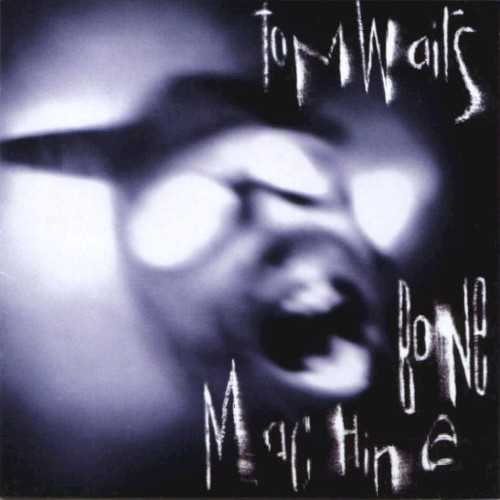 | Album: 15 of 28 Title: Bone Machine Released: 1992-08 Tracks: 16 Duration: 54:07 Scroll: Up Down Top Bottom 25% 50% 75% Spotify Wikipedia Allmusic AlbumCover | 1 Earth Died Screaming (03:39) 2 Dirt in the Ground (04:10) 3 Such a Scream (02:10) 4 All Stripped Down (03:05) 5 Who Are You (03:59) 6 The Ocean Doesn’t Want Me (01:53) 7 Jesus Gonna Be Here (03:22) 8 A Little Rain (03:00) 9 In the Colosseum (04:52) 10 Goin’ Out West (03:22) 11 Murder in the Red Barn (04:31) 12 Black Wings (04:39) 13 Whistle Down the Wind (04:37) 14 I Don’t Wanna Grow Up (02:32) 15 Let Me Get Up on It (00:57) 16 That Feel (03:12) |
| Bone Machine : Allmusic album Review : Perhaps Tom Waits most cohesive album, Bone Machine is a morbid, sinister nightmare, one that applied the quirks of his experimental 80s classics to stunningly evocative -- and often harrowing -- effect. In keeping with the titles grotesque image of the human body, Bone Machine is obsessed with decay and mortality, the ease with which earthly existence can be destroyed. The arrangements are accordingly stripped of all excess flesh; the very few, often non-traditional instruments float in distinct separation over the clanking junkyard percussion that dominates the record. Its a chilling, primal sound made all the more otherworldly (or, perhaps, underworldly) by Waits raspy falsetto and often-distorted roars and growls. Matching that evocative power is Waits songwriting, which is arguably the most consistently focused its ever been. Rich in strange and extraordinarily vivid imagery, many of Waits tales and musings are spun against an imposing backdrop of apocalyptic natural fury, underlining the insignificance of his subjects and their universally impending doom. Death is seen as freedom for the spirit, an escape from the dread and suffering of life in this world -- which he paints as hellishly bleak, full of murder, suicide, and corruption. The chugging, oddly bouncy beats of the more uptempo numbers make them even more disturbing -- theres a detached nonchalance beneath the horrific visions. Even the narrator of the catchy, playful "I Dont Wanna Grow Up" seems hopeless in this context, but that song paves the way for the closer "That Feel," an ode to the endurance of the human soul (with ultimate survivor Keith Richards on harmony vocals). The more upbeat ending hardly dispels the cloud of doom hanging over the rest of Bone Machine, but it does give the listener a gentler escape from that terrifying sonic world. All of it adds up to Waits most affecting and powerful recording, even if it isnt his most accessible. | ||
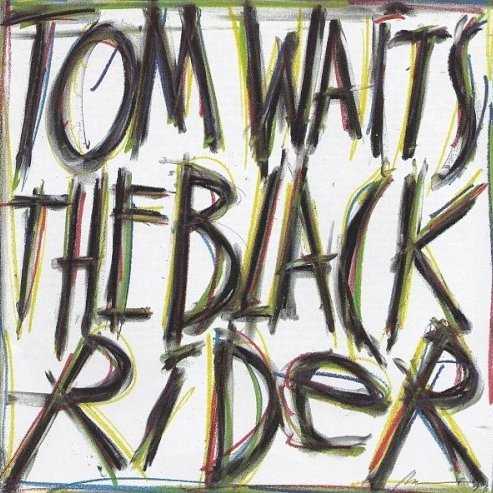 | Album: 16 of 28 Title: The Black Rider Released: 1993-10-25 Tracks: 20 Duration: 56:16 Scroll: Up Down Top Bottom 25% 50% 75% Spotify Allmusic Wikipedia AlbumCover | 1 Lucky Day (overture) (02:30) 2 The Black Rider (03:23) 3 November (02:55) 4 Just the Right Bullets (03:37) 5 Black Box Theme (02:44) 6 T Aint No Sin (02:27) 7 Flash Pan Hunter (intro) (01:11) 8 Thats the Way (01:09) 9 The Briar and the Rose (03:52) 10 Russian Dance (03:14) 11 Gospel Train (orchestra) (02:35) 12 Ill Shoot the Moon (03:53) 13 Flash Pan Hunter (03:12) 14 Crossroads (02:45) 15 Gospel Train (04:45) 16 Interlude (00:20) 17 Oily Night (04:25) 18 Lucky Day (03:44) 19 The Last Rose of Summer (02:09) 20 Carnival (01:16) |
| The Black Rider : Allmusic album Review : Tom Waits collaborated with director Robert Wilson and librettist William Burroughs on the musical stage work The Black Rider in 1990. A variation on the Faust legend, the 19th century German story allowed Waits to indulge his affection for the music of Kurt Weill and address one of his favorite topics of recent years, the devil. Waits had proven an excellent collaborator when he worked with director Francis Ford Coppola on One from the Heart, making that score an integral part of the film. Here, the collaboration and the established story line served to focus Waits often fragmented attention, lending coherence and consistency. He then had three years to adapt the score into a record album in which he did most of the singing and writing (though Burroughs contributed, singing one song and writing lyrics to three), and he used the time to come up with his best recording in a decade, a varied set of songs that work whether or not you know the show. (Seven of the 20 tracks were instrumentals.) Waits used the word "crude" to describe his working method several times in the liner notes, and a crude performing and recording style continued to appeal to him. But the kind of chaos that can sometimes result from that style was reined in by the bands he assembled in Germany and Los Angeles to record the score, so that the recordings were lively without being off-puttingly primitive. | ||
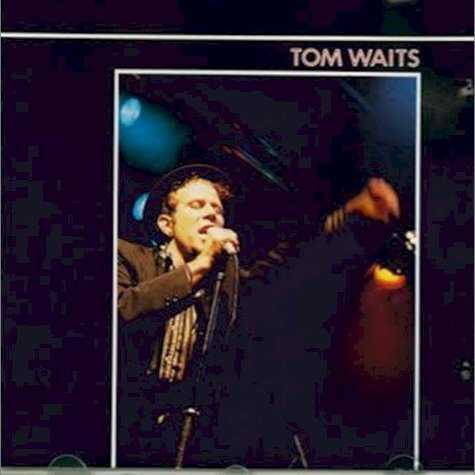 | Album: 17 of 28 Title: Super Stars Best Collection: Tom Waits Released: 1997 Tracks: 12 Duration: 51:20 Scroll: Up Down Top Bottom 25% 50% 75% AlbumCover | 1 The Heart of Saturday Night (03:53) 2 New Coat of Paint (03:23) 3 Grapefruit Moon (04:51) 4 Please Call Me, Baby (04:26) 5 San Diego Serenade (03:30) 6 Shiver Me Timbers (04:27) 7 I Wish I Was in New Orleans (04:55) 8 Semi Suite (03:30) 9 The Piano Has Been Drinkin (03:41) 10 Marha (04:30) 11 I Never Talk to Strangers (03:41) 12 Tom Trauberts Blues (Dancin Mathilda) (06:33) |
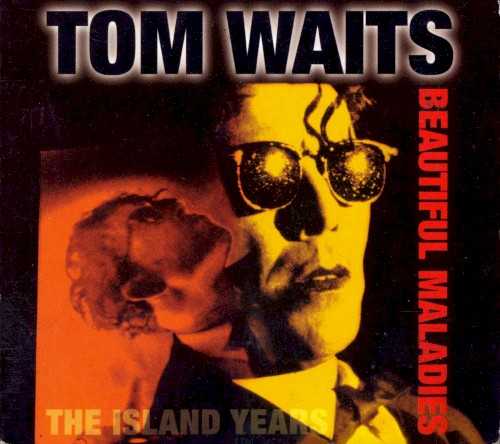 | Album: 18 of 28 Title: Beautiful Maladies: The Island Years Released: 1998-06-15 Tracks: 23 Duration: 1:14:11 Scroll: Up Down Top Bottom 25% 50% 75% Spotify Allmusic AlbumCover | 1 Hang on St. Christopher (02:46) 2 Temptation (03:53) 3 Clap Hands (03:48) 4 The Black Rider (03:23) 5 Underground (02:01) 6 Jockey Full of Bourbon (02:47) 7 Earth Died Screaming (03:39) 8 Innocent When You Dream (78) (03:08) 9 Straight to the Top (Rhumba) (02:30) 10 Franks Wild Years (01:53) 11 Singapore (02:45) 12 Shore Leave (04:18) 13 Johnsburg, Illinois (01:33) 14 Way Down in the Hole (03:30) 15 Strange Weather (03:35) 16 Cold Cold Ground (03:27) 17 November (02:55) 18 Downtown Train (03:53) 19 16 Shells From a Thirty-Ought-Six (04:33) 20 Jesus Gonna Be Here (03:22) 21 Good Old World (waltz) (03:55) 22 I Don’t Wanna Grow Up (02:32) 23 Time (03:56) |
| Beautiful Maladies: The Island Years : Allmusic album Review : Tom Waits brilliance is messy -- he has so many ideas that sometimes unrealized songs are juxtaposed with moments of greatness on his albums. That may make for the occasional uneven record, but each album has its own distinct tone that makes it a unique listening experience, whether its a masterpiece or a missed opportunity. And thats the reason why his work, especially his sprawling Island albums, doesnt lend itself to retrospectives like Beautiful Maladies: The Island Years. On the surface, the collection looks promising. The single disc features 22 tracks from Swordfishtrombones, Rain Dogs, Franks Wild Years, Big Time, Bone Machine, and The Black Rider, including such familiar and celebrated items as "Hang on St. Christopher," "Innocent When You Dream," "I Dont Wanna Grow Up," "16 Shells from a Thirty-Ought Six," and "Downtown Train." Some fans might spot missing favorites, but its hard to fault the selections themselves -- if it werent for the fact that they all sound somewhat disjointed when separated from the original albums. Because of this, Beautiful Maladies is a little odd -- its not a bad sampler, but it isnt necessarily a good introduction since the songs dont sound like they belong together. The curious may want this as a sampler, but if you wind up liking Waits, you wont be satisfied with anything other than the original albums. | ||
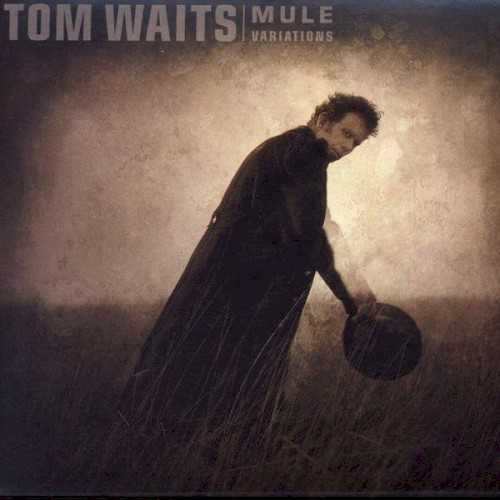 | Album: 19 of 28 Title: Mule Variations Released: 1999-04-14 Tracks: 18 Duration: 1:15:31 Scroll: Up Down Top Bottom 25% 50% 75% Spotify Allmusic Wikipedia AlbumCover | 1 Big in Japan (04:05) 2 Lowside of the Road (02:59) 3 Hold On (05:33) 4 Get Behind the Mule (06:52) 5 House Where Nobody Lives (04:14) 6 Cold Water (05:23) 7 Pony (04:32) 8 What’s He Building? (03:20) 9 Black Market Baby (05:02) 10 Eyeball Kid (04:25) 11 Picture in a Frame (03:39) 12 Chocolate Jesus (03:55) 13 Georgia Lee (04:24) 14 Filipino Box Spring Hog (03:09) 15 Take It With Me (04:24) 16 Come on Up to the House (04:36) 17 Buzz Fledderjohn (04:12) 18 Big Face Money (00:38) |
| Mule Variations : Allmusic album Review : Tom Waits grew steadily less prolific after redefining himself as a junkyard noise poet with Swordfishtrombones, but the five-year wait between The Black Rider and 1999s Mule Variations was the longest yet. Given the fact that Waits decided to abandon major labels for the California indie Epitaph, Mule Variations would seem like a golden opportunity to redefine himself and begin a new phase of his career. However, it plays like a revue of highlights from every album hes made since Swordfishtrombones. Of course, thats hardly a criticism; the album uses the ragged cacophony of Bone Machine as a starting point, and proceeds to bring in the songwriterly aspects of Rain Dogs, along with its affection for backstreet and backwoods blues, plus a hint of the beatnik qualities of Swordfish. So Mule Variations delivers what fans want, in terms of both songs and sonics. But that also explains why it sounds terrific on initial spins, only to reveal itself as slightly dissatisfying with subsequent plays. All of Waits Island records felt like fully conceived albums with genuine themes. Mule Variations, in contrast, is a collection of moments, and while each of those moments is very good (some even bordering on excellent), ultimately the whole doesnt equal the sum of its parts. While that may seem like nitpicking, some may have wanted a masterpiece after five years, and Mule Variations falls short of that mark. Nevertheless, this is a hell of a record by any other standard. Waits is still writing terrific songs and matching them with wildly evocative productions; furthermore, its his lightest record in years -- its actually fun to listen to, even with a murder ballad here and a psycho blues there. In that sense, its a unique item in his post-Swordfish catalog, and that may make up for it not being the masterpiece it seemed like it could have been. | ||
 | Album: 20 of 28 Title: Used Songs: 1973–1980 Released: 2001-10-23 Tracks: 16 Duration: 1:17:12 Scroll: Up Down Top Bottom 25% 50% 75% Spotify Allmusic AlbumCover | 1 Heartattack and Vine (04:50) 2 Eggs and Sausage (In a Cadillac With Susan Michelson) (04:19) 3 A Sight for Sore Eyes (04:40) 4 Whistlin’ Past the Graveyard (03:17) 5 Burma‐Shave (06:33) 6 Step Right Up (05:43) 7 Ol’ ’55 (03:58) 8 I Never Talk to Strangers (03:38) 9 Mr. Siegal (05:14) 10 Jersey Girl (05:11) 11 Christmas Card From a Hooker in Minneapolis (04:33) 12 Blue Valentines (05:50) 13 (Looking for) The Heart of Saturday Night (03:53) 14 Muriel (03:33) 15 Wrong Side of the Road (05:14) 16 Tom Traubert’s Blues (Four Sheets to the Wind in Copenhagen) (06:39) |
| Used Songs: 1973–1980 : Allmusic album Review : Rhinos fine 16-track collection Used Songs (1973-1980) chronicles Tom Waits first seven albums, all recorded for Asylum Records. This contains pretty much all his staples from the 70s -- "Heartattack and Vine," "Burma Shave," "Ol 55," "Jersey Girl," "(Looking For) The Heart of Saturday Night," and "Tom Trauberts Blues" among them -- sequenced not chronologically, but sequenced for maximum impact. Given the sheer amount of music Waits made for Asylum, it shouldnt be surprising that there are some fan favorites missing, but there are no complaints with what is here, and this provides a near-perfect encapsulation of his pre-Island years, especially for those only familiar with the Island recordings. | ||
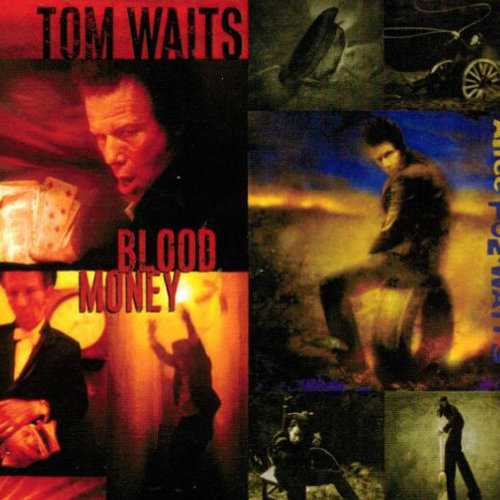 | Album: 21 of 28 Title: Were All Mad Here: A Conversation With Tom Waits Released: 2002 Tracks: 31 Duration: 51:51 Scroll: Up Down Top Bottom 25% 50% 75% AlbumCover | 1 Intro: "Misery Is the River of the World" (Fragment From Blood Money) (00:27) 2 Introductory Remark (00:09) 3 Marketing Strategy (00:59) 4 Song: "Gods Away On Business" (From Blood Money) (02:59) 5 The Word "Opera" Means Work (01:32) 6 Song: "Table Top Joe" (From Alice) (04:10) 7 Magic or Medicine? (00:34) 8 Alice On Ice (00:52) 9 Song: "Alice" (From Alice) (04:25) 10 Getting an Early Start (00:53) 11 Song: "Kommienezuspadt" (From Alice) (03:57) 12 The Program (00:50) 13 Circular Violin (01:24) 14 Song: "Were All Mad Here" (From Alice) (02:30) 15 Two or More Sides (00:24) 16 Strumming the Spiders Web (02:10) 17 Song: "Watch em Disappear" (From Alice) (02:29) 18 Word Guy, Word Gal (01:12) 19 Song: "Lullaby" (From Blood Money) (02:08) 20 I Might Just Hum It (01:27) 21 Song: "Another Mans Vine" (From Blood Money) (02:25) 22 Sexy and Scary (00:21) 23 Spastic Colon (00:33) 24 Song: "Starving in the Belly of a Whale" (From Blood Money) (03:40) 25 Kind of a Riddle (00:25) 26 The Highest Form of Flattery (01:17) 27 Song: "Woe" (From Blood Money) (01:19) 28 New Song Titles (02:29) 29 Closing Pitch (00:47) 30 Song: "Fawn" (From Alice) (01:40) 31 Creamed (01:24) |
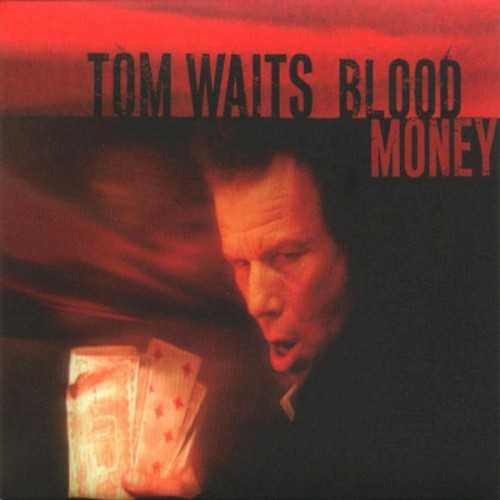 | Album: 22 of 28 Title: Blood Money Released: 2002-05-06 Tracks: 13 Duration: 42:16 Scroll: Up Down Top Bottom 25% 50% 75% Spotify Allmusic Wikipedia AlbumCover | 1 Misery Is the River of the World (04:25) 2 Everything Goes to Hell (03:45) 3 Coney Island Baby (04:02) 4 All the World Is Green (04:36) 5 God’s Away on Business (02:59) 6 Another Man’s Vine (02:28) 7 Knife Chase (02:26) 8 Lullaby (02:09) 9 Starving in the Belly of a Whale (03:41) 10 The Part You Throw Away (04:22) 11 Woe (01:20) 12 Calliope (01:59) 13 A Good Man Is Hard to Find (03:57) |
| Blood Money : Allmusic album Review : Tom Waits has said: "I like a beautiful song that tells you terrible things. We all like bad news out of a pretty mouth." When it comes to the material on Blood Money, I dont know if I can call Waits mouth pretty, but he certainly offers plenty of bad news in a very attractive, compelling way. Released simultaneously with Alice, a recording of songs written in 1990, Blood Money is a set of 13 songs written by Waits and Kathleen Brennan in collaboration with dramatist Robert Wilson. The project was a loose adaptation of the play Woyzeck, originally written by German poet Georg Buchner in 1837. The play was inspired by the true story of a German soldier who was driven mad by bizarre army medical experiments and infidelity, which led him to murder his lover -- cheery stuff, to be sure. Thematically, this work -- with its references to German cabarets and nostalgia -- echoes Waits other Wilson collaborative project, Black Rider. Musically, however, Blood Money is a far more elegant, stylish, and nuanced work than the earlier recording. With bluesman Charlie Musselwhite, reedman Colin Stetson, bassist and guitarist Larry Taylor, marimbist Andrew Borger, and others -- Waits plays piano, organ, marimba, calliope, and guitar -- this is a theater piece that feels like a collection of songs that reflect a perverse sense of black humor and authentic wickedness in places. The protagonists of these songs are so warped and wasted by life that they are caricatures; its impossible not to like them and to not be repulsed by yourself for doing so. For starters, the set opens with "Misery Is the River of the World," a circus-like tango wrapped around a series of dialectical aphorisms: "If theres one thing you can say about mankind/Theres nothing kind about man." When a piano cascades up a minor scale in dramatic showmanship, Waits chants the refrain, "Misery is the river of the world," with seeming delight. On "Gods Away on Business" (with guests Stewart Copeland on drums and PJ Harvey guitarist Joe Gore) the rhythm first displayed on Bone Machine resurfaces and fills out the backbeat. Its almost a march in its depth and dimension, giving the entire track the feeling of an evil seven dwarfs about to roast Snow White for dinner: "Id sell your heart to the junkman, baby/For a buck, for a buck/If youre looking for someone to pull you out of that ditch/Youre out of luck, out of luck." This is bleak, disturbing, and hysterically funny. Its not all snakes and alligators, however. In "Coney Island Baby," Waits delivers one of his most memorable and moving love songs while playing the chamberlain in front of the band, who plays an old-time waltz laced through with gorgeous cello and trumpet slipping ethereally through the mix. Waits croons without affectation or droopy sentiment: "Every night she comes/To take me out to dreamland/When Im with her/Im the richest man in the town/Shes a rose/Shes a pearl/Shes the spin on my world/All the stars make wishes on her eyes." Likewise, the track that follows it, "All the World Is Green," is a paean of love from the soldier to his wife and "Another Mans Vine" boasts the most overtly sensuous use of the word "bougainvillea" in a pop song. In all, Blood Money, like its sister, Alice, is a record steeped in musical and lyrical traditions barely remembered by popular culture and hence very rarely evoked (from carnival marches to tarantellas, primitive tangos, and early 20th century jazz). This isnt the other side of Tin Pan Alley, but an appreciation for and evocation of the music of the Weimar Republic with its easy pathos and often grotesque funhouse humor. That said, this appreciation does not make for a re-creation; Waits music is his own from this particular place in time, but it illustrates and illuminates particular kinds of human foibles from the present era and celebrates them as human nonetheless. | ||
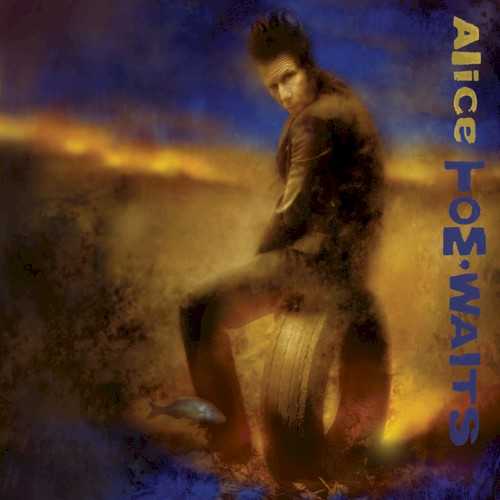 | Album: 23 of 28 Title: Alice Released: 2002-05-07 Tracks: 15 Duration: 48:23 Scroll: Up Down Top Bottom 25% 50% 75% Spotify Allmusic Wikipedia AlbumCover | 1 Alice (04:28) 2 Everything You Can Think (03:10) 3 Flower’s Grave (03:28) 4 No One Knows I’m Gone (01:42) 5 Kommienezuspadt (03:10) 6 Poor Edward (03:42) 7 Table Top Joe (04:14) 8 Lost in the Harbour (03:45) 9 We’re All Mad Here (02:31) 10 Watch Her Disappear (02:33) 11 Reeperbahn (04:02) 12 I’m Still Here (01:49) 13 Fish & Bird (03:59) 14 Barcarolle (03:59) 15 Fawn (01:43) |
| Alice : Allmusic album Review : Its been long time since Tom Waits recorded an album as saturated with tenderness as this one. The carny-barker noise merchant who has immersed himself in brokenness and reportage from lifes seamy, even hideous underbelly for decades has created, along with songwriting and life partner Kathleen Brennan, a love song cycle so moving and poetic that its almost unbearable to take in one sitting. Alice is alleged to be the "great lost Waits masterpiece." Waits and Brennan collaborated with Robert Wilson on a stage production loosely based on Alice Liddell, the young girl who was the obsession and muse of Lewis Carrolls Alice in Wonderland books. The show ran in Europe for a time and the productions 15 songs were left unrecorded until now. Alice forgoes the usual nightmare lyric sequences, warped, circus-like melodies, and sonic darknesses that have been part and parcel of Waits work since Swordfishtrombones. Instead, this song cycle is, for the most part, steeped in jazz ballads, old waltzes, European folk songs, theatrical love paeans, and music not so easily identified. The instrumentation is different, with the utilization of a small chamber orchestra (the violins are Stroh violins, instruments outfitted with a metal horn on the end for amplification purposes), marimbas, piano, organ, woodwinds, and reeds, and the complete absence of guitars. The set opens with the title track, a smoky jazz ballad that may echo Waits work from the 1970s, but is actually miles beyond it in scope. Here there is no purposely postured nuance or affectation of persona. The lyric is plaintive and full of pathos; its almost a suicide note set to the most romantic melodic invention lounge jazz is capable of. As Waits sings, "The only strings that hold me here/Are tangled up around the pier/And so a secret kiss/Brings madness with the bliss/And I will think of this/When Im dead and in my grave/Set me adrift/Im lost over there/But I must be insane/To go on skating on your name/And by tracing it twice I fell through the ice/Of Alice/Theres only Alice," the world turns inside out and the listener can no longer decide if this is a man or a ghost reporting from beneath the ponds surface. If love brings this, if obsession has such a cost, how can they be steeped in tenderness this transparent and plain? Elsewhere, Waits manages to delve into the voice of the turned-out lover, the rejected stone, the lost madman, as he does on "Were All Mad Here" and "Everything You Can Think." But even here there is a reflective dimension, nearly childlike in their simple embrace of loss, dispossession, and descent into the maelstrom of the human soul. Ghosts whisper in the mix, spirits float through the air, and demons passionately possess the protagonists. In the simpler, melting melodies of "Lost in the Harbour," "No One Knows Im Gone," and the haunting tango at the heart of "Watch Her Disappear," obsession with the unmentionable (let alone the unattainable) is offered as an empathy for powerlessness, buoyed up by an instrumental crutch, arranged to give a voice to those who dare not speak publicly. The melodies on Alice are easily the most direct Waits has written since Blue Valentine, but are more elegant than even those found on Foreign Affairs or Black Rider. Alice is no step back, but a further step toward oblivion -- the place where the sound of desolation, the melody of loneliness, and the confused darkness at the root of the human heart come together and speak as one in a nursery rhyme for adults. | ||
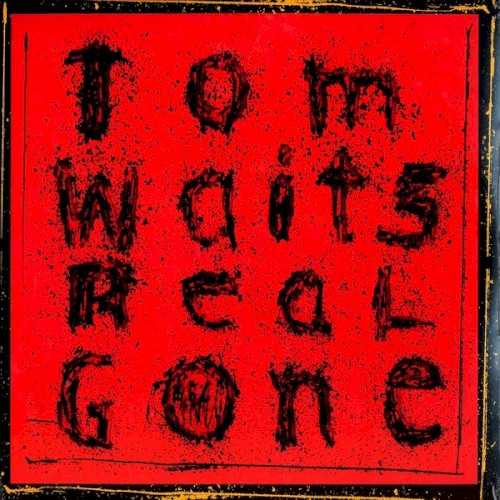 | Album: 24 of 28 Title: Real Gone Released: 2004-10-04 Tracks: 16 Duration: 1:12:07 Scroll: Up Down Top Bottom 25% 50% 75% Spotify Allmusic Wikipedia AlbumCover | 1 Top of the Hill (04:54) 2 Hoist That Rag (04:20) 3 Sins of My Father (10:36) 4 Shake It (03:52) 5 Dont Go Into That Barn (05:22) 6 Hows It Gonna End (04:51) 7 Metropolitan Glide (04:13) 8 Dead and Lovely (05:40) 9 Circus (03:56) 10 Trampled Rose (03:58) 11 Green Grass (03:13) 12 Baby Gonna Leave Me (04:29) 13 Clang Boom Steam (00:46) 14 Make It Rain (03:39) 15 Day After Tomorrow (06:53) 16 A-Chick-a-Boom (01:17) |
| Real Gone : Allmusic album Review : On Real Gone, Tom Waits walks a fraying tightrope. By utterly eliminating one of the cornerstone elements of his sound -- keyboards -- he has also removed his safety net. With songwriting and production partner Kathleen Brennan, he strips away almost everything conventional from these songs, taking them down to the essences of skeletal rhythms, blasted and guttural blues, razor-cut rural folk music, and the rusty-edge poetry and craft of songwriting itself. His cast includes guitarists Marc Ribot and Harry Cody, bassist/guitarist Larry Taylor, bassist Les Claypool, and percussionists Brain and Casey Waits (Toms son), the latter of whom also doubles on turntables. This does present problems, such as on the confrontational opener, "Top of the Hill." Waits uses his growling, grunting vocal atop Ribots monotonously funky single-line riff and Caseys turntables to become a human beatbox offering ridiculously nonsensical lyrics. Its a throwaway, and the album would have been better had it been left off entirely. But its also a canard, a sleight-of-hand strategy hes employed before. The jewels shine from the mud immediately after. The mutated swamp tango of "Hoist That Rag" has stuttered clangs and quakes for drums, decorated by distorted Latin power chords and riffs from Ribot, along with thundering deep bass from Claypool. On the ten-plus minute "Sins of My Father," Codys spooky banjo walks with Taylors low-strung bass and Waits shimmering reverbed guitar as he ominously croons, revealing a rigged game of "star-spangled glitter" where "justice wears suspenders and a powdered wig." Its part revelation, part East of Eden, and part backroom political culture framed by the eve of the apocalypse. Its hunted, hypnotic, and spooky. In stripping away convention, Waits occasionally lets his songs go to extremes with absurd simplicity, such as on "Dont Go into That Barn," a musical cousin to his spoken "Whats He Building?" from Mule Variations. But theres also the downright riotous squall of "Shake It," which sounds like an insane carny barker jamming with R.L. Burnside, or the riotous raging blues of "Baby Gonna Leave Me." There are "straight" narratives such as "Hows It Gonna End," with its slow and brooding beat storyline, and the moving murder ballad "Dead and Lovely," with its drooping, shambolic elegance. Theres the spoken word "Circus," with its wispy spindly frame that features Waits on chamberlain. And "Metropolitan Glide" feels like a hell-bent duet between James Brown and Captain Beefhearts Magic Band, followed by the fractured, busted-love, ranting-at-God pain that rips through "Make It Rain." The tender "Green Grass" is among Waits finest broken love songs; its movingly rendered by a character who could have resided in one of William Kennedys novels. The set closes with "Day After Tomorrow," featured on MoveOn.orgs Future Soundtrack for America. It is one of the most insightful and understated antiwar songs to have been written in decades. It contains not a hint of banality or sentiment in its folksy articulation. Real Gone is another provocative moment for Waits, one that has problems, but then, all his records do. His excesses, however, do nothing to cloud the stellar achievements of his risk-taking vision and often brilliant execution. | ||
 | Album: 25 of 28 Title: Orphans: Brawlers, Bawlers & Bastards Released: 2006-11-17 Tracks: 56 Duration: 3:09:44 Scroll: Up Down Top Bottom 25% 50% 75% Spotify Allmusic Wikipedia AlbumCover | 1 Lie to Me (02:10) 2 LowDown (04:15) 3 2:19 (05:02) 4 Fish in the Jailhouse (04:22) 5 Bottom of the World (05:42) 6 Lucinda (04:52) 7 Ain’t Goin’ Down to the Well (02:28) 8 Lord I’ve Been Changed (02:28) 9 Puttin’ On the Dog (03:39) 10 Road to Peace (07:17) 11 All the Time (04:33) 12 The Return of Jackie and Judy (03:28) 13 Walk Away (02:43) 14 Sea of Love (03:43) 15 Buzz Fledderjohn (04:12) 16 Rains on Me (03:20) 1 Bend Down the Branches (01:06) 2 You Can Never Hold Back Spring (02:26) 3 Long Way Home (03:10) 4 Widow’s Grove (04:58) 5 Little Drop of Poison (03:09) 6 Shiny Things (02:20) 7 World Keeps Turning (04:16) 8 Tell It to Me (03:08) 9 Never Let Go (03:13) 10 Fannin Street (05:01) 11 Little Man (04:33) 12 It’s Over (04:40) 13 If I Have to Go (02:15) 14 Goodnight Irene (04:47) 15 The Fall of Troy (03:00) 16 Take Care of All My Children (02:31) 17 Down There by the Train (05:38) 18 Danny Says (03:05) 19 Jayne’s Blue Wish (02:29) 20 Young at Heart (03:41) 1 What Keeps Mankind Alive (02:09) 2 Children’s Story (01:42) 3 Heigh Ho (03:32) 4 Army Ants (03:25) 5 Books of Moses (02:49) 6 Bone Chain (01:03) 7 Two Sisters (04:55) 8 First Kiss (02:40) 9 Dog Door (02:43) 10 Redrum (01:12) 11 Nirvana (02:12) 12 Home I’ll Never Be (02:28) 13 Poor Little Lamb (01:43) 14 Altar Boy (02:48) 15 The Pontiac (01:54) 16 Spidey’s Wild Ride (02:03) 17 King Kong (05:29) 18 On the Road (04:14) 19 Dog Treat (02:56) 20 Missing My Son (03:38) |
| Orphans: Brawlers, Bawlers & Bastards : Allmusic album Review : At this stage of the game, any new Tom Waits record is an event. Listening through the music of his entire career is daunting, to say the least, but its a journey no one else, with the possible exception of Bob Dylan, has taken before. If one listens to the official recordings, from 1973s Closing Time, featuring the songs of an itinerant Beat barroom singer (no lounges please), right on through to the frenetic mania of 2004s Real Gone, one becomes aware of not only the twists and turns of a songwriter wrestling and bellowing at and with his muse, but of a journeyman artist barely able to hold on to the lid of his creativity, let alone keep it on. True, there have been many stops along the way: in the seediest lounges (1977s Foreign Affairs, which could have been a twisted inspiration to novelist Phillip Kerr when he wrote the Berlin Noir trilogy); acid-drenched blues scree (1980s Heartattack and Vine); travelogues of the unseen and the unspeakable (1985s Rain Dogs); seething and murderous suburban nightmares (1987s Franks Wild Years); the frighteningly comic tales of plagues and carnivals (1993s Black Rider); the scrape, squeal, and hollowed-out metal crunch of urban junkyards and classically American paranoia (1999s Mule Variations); and through-the-mirror-darkly image nightmares and fairy tale variations (2002s Alice and Blood Money). All of it is contained in the man who takes delight in the bent, quarreling marriage of song and sound with dangerously comic imagery. Orphans is the most unwieldy Tom Waits collection yet. Packaged in a Cibachrome-tinted box are three discs containing 56 songs total. It claims 30 new tunes, but a mere 14 can be found on other records -- six others have to be hunted for while the remainder have shown up in various incarnations. This crazy thing began as a collection of outtakes, rarities, soundtrack tunes, and compilation-only cuts -- some of which survive here in new form, including tracks from the Ramblin Jack Elliot tribute, the Bridge benefit, and two Ramones covers, to name a few. In other words, the first conception was as a hodgepodge collection of attic material. Waits checked out the tune selection as it was and said something like "nah, bad idea; this would suck." So, he did what any self-respecting artist with a head full of ideas, two stomping, shuffling feet, and itchy fingers -- and time on his hands -- would do: he recorded new songs and re-recorded others, so the thing would have some kind of elasticity yet hold its rickety bone and far-reaching sources together by means of cheap glue, chewed gum, solder, and a visionary recording engineer named Karl Derfler. The end result is this daunting triple disc divided by title and theme: disc one is "Brawlers," Waits rock and blues record, evoking everyone from T. Rex and Johnny Burnette to Sonny Curtis and Howlin Wolf. Its a grand thing, since he hasnt released one like this before -- the closest were Heartattack and Vine on one side and Mule Variations on the other. Travel, regret, murder, salvation, guttersnipe meditations on sorrow, and nefarious and broken-down innocent -- and nefarious -- amorous intentions are a few of the themes that run through these tunes like oil and sand. Disc two is "Bawlers," a collection of ballads, raw love songs, weepy wine tunes, wistful yet tentative hope -- in the form of floppy prayers -- and an under-the-table and wishing, bewildered, yet dead-on topical tome on the worlds political situation. Disc three, entitled "Bastards," is even edgier; its Waits hanging out there with his music and muse on the lunatic fringe of experimentation. Think Bone Machines wilder moments and Waits loopy standup comedy in the form of six spoken word pieces included here. Thank goodness he finally did this. If youve ever seen the man on a stage, youll get why these are so important immediately. "Brawler" digs deep into the American roots music that has obsessed Waits since the beginning of his long labyrinthine haul. Theres the frenetic rockabilly swagger that probably makes Carl Perkins and Gene Vincent shake and shimmy in their graves. One of the movie tunes, a cover of "Sea of Love," recalls its place in the film for those whove seen it. If you havent, its a slanted, tarnished jewel freshly liberated from antiquity. The hobo ballad "Bottom of the World" recalls old country gospel, and "Lucinda" can only be described as a gallows dance tune. The slippery hoodoo blues "Road to Peace" is the seasons most timely and topical political song. "Bawlers" is the sets bridge, and its easy to see why: its the most accessible disc in the box. There are some of the movie tunes here, from flicks like Pollock, Big Bad Love, and Shrek 2. Other cuts, such as "Goodnight Irene," recall "Tom Trauberts Blues (Four Sheets to the Wind in Copenhagen)" from the Small Change album; the singing protagonist here is older and more desperate, almost suicidal. Resignation displaces hope; its a long reach into the past and expresses the void of the present. The cover of the Ramones "Danny Says" is completely reinvented; its one of the loneliest, most sweetly desolate of Waits many sides. Its not all darkness, however; there are gorgeous songs here too, such as "Never Let Go" and "You Can Never Hold Back Spring," where an indomitable human spirit reins and rings true. Finally, it comes down to "Bastards." The eerie, strange, cabaret-in-a-carnival music that is Weill and Brechts "What Keeps Mankind Alive" enlists banjos, accordion, tuba, and big bass drum as simply the means to let these twisted words out of the box. Thankfully the cover of "Books of Moses," originally by Skip Spence, is here, as is Daniel Johnstons "King Kong." Neither of these cuts resembles their original version, and Waits brings out the dark underbelly inherent in each. "Bedtime Story" is the first of the Waits monologues here. It is the repressed wish of every parent (with a sense of humor) to have the temerity to tell this kind of tale to their children when they retire. Others include a reading of Charles Bukowskis "Nirvana," the hilarious monologue "The Pontiac," and the live routine "Dog Door." Perhaps the most inviting cut here is the piano-and-horn ballad "Altar Boy," a postmodern saloon song that would make Bobby Short turn red with rage. This disc is the true mixed bag in the set: unruly, uneven, and full of feints and free-for-alls. Ultimately, the epicenter of Orphans is Waits voice. Its many expressions, nuances, bellows, barks, hollers, open wails, roughshod croons, and midnight whispers carry these songs and monologues to the listener with authority as an open invitation into his sound world, his view of tradition, and his manner of shaping that world as something not ephemeral, but as an extension of musical time itself. As a vocalist, Waits, like Bob Dylan, embodies the entire genealogical line of the blues, jazz, local barroom bards, and traveling minstrels in the very grain of his songs. That wily throat carries not only the songs he and his songwriting partner and wife, Kathleen Brennan, pen, but also the magnet for the sonic atmospheres that frame it. There is adventure, danger, and the sound of the previous, the forgotten, and the wished for in it. And it is that voice that links all three of these discs together and makes them partners. One cannot dismiss that even though some of these songs have appeared elsewhere, Orphans is a major work that goes beyond the origins of the material and drags everything past and present with sound and texture into a present to be presented as something utterly new, beyond anything he has previously issued. To paraphrase Ezra Pound in response to Allen Ginsbergs inquiry about what his poem "The Cantos" meant, these orphans speak for themselves. | ||
 | Album: 26 of 28 Title: Bad as Me Released: 2011-10-21 Tracks: 16 Duration: 54:03 Scroll: Up Down Top Bottom 25% 50% 75% Spotify Allmusic AlbumCover | 1 Chicago (02:15) 2 Raised Right Men (03:24) 3 Talking at the Same Time (04:14) 4 Get Lost (02:42) 5 Face to the Highway (03:43) 6 Pay Me (03:14) 7 Back in the Crowd (02:49) 8 Bad as Me (03:10) 9 Kiss Me (03:41) 10 Satisfied (04:05) 11 Last Leaf (02:56) 12 Hell Broke Luce (03:57) 13 New Year’s Eve (04:32) 1 She Stole the Blush (02:51) 2 Tell Me (03:43) 3 After You Die (02:47) |
| Bad as Me : Allmusic album Review : Bad as Me is Tom Waits first collection of new material in seven years. He and Kathleen Brennan -- wife, co-songwriter, and production partner -- have, at the latters insistence, come up with a tight-knit collection of short tunes, the longest is just over four minutes. This is a quick, insistent, and woolly aural road trip full of compelling stops and starts. While hes kept his sonic experimentation -- especially with percussion tracks -- Waits has returned to blues, rockabilly, rhythm & blues, and jazz as source material. Instead of sprawl and squall, we get chug and choogle. For "Chicago" -- via Clint Maedgens saxes, Keith Richards (who appears sporadically here) and Marc Ribots guitars, son Casey Waits drums, dads banjo, percussion and piano, and Charlie Musselwhites harmonica (he appears numerous times here, too) -- we get a 21st century take on vintage R&B.; Indeed, one can picture Big Joe Turner fronting this clattering rush of grit and groove, and this album is all about groove. Augie Meyers appears on Vox organ and Flea on bass to guide Waits tablas and vocals on "Raised Right Men," a 12-bar stagger filled with delightful lyrical clichés from an America that has passed on into myth -- Waits does nothing to de-mystify this; he just makes it greasy and danceable. The slow, spooky "Talking at the Same Time" is still in blues form albeit with ska-styled horns to make things more exotic, as Waits waxes about the current state of economic affairs. He showcases historys circular nature as he bridges our national narrative from 1929-1941, and up to the present day: "Well it’s hard times for some/For others it’s sweet/Someone makes money when there’s blood in the street...Well we bailed out all the millionaires/They got the fruit/We got the rind..." Rockabilly rears its head on "Get Lost," with David Hidalgo strutting a solid 50s guitar snarl above the horns. Dawn Harms violin and Patrick Warrens keyboards add textural dimension to Hidalgos and Ribots arid guitars on the apocalyptic blues of "Face to the Highway," with Waits offering startling, contrasting images in gorgeous rhymes. This track, and the two proceeding ones -- the forlorn carny ballad "Pay Me" and the wasted lovers plea in the West Texas mariachi of "Back in the Crowd" -- set up the latter half of the record, where there are more hard-edged blues and rockers, such as the spiky stomping title track, the cracked guitar ramble in "Satisfied," and the clattering, percussive anti-war rant "Hell Broke Luce" (sic). Between each of these songs are ballads. In the jazzy nightclub blues of "Kiss Me" and the country-ish folk of "Last Leaf" lie lineage traces to Waits earliest material: the latter features Richards in a delightfully ruined vocal duet. Indeed, even the set-closer "New Years Eve," with Hidalgos guitars and accordion in one of Waits signature saloon songs, quotes from "Auld Lang Syne" in the songs waning moments to send the platter off on a bittersweet, nostalgic note, reminding the listener of Waits use of "Waltzing Matilda" in "Tom Trauberts Blues" all those years ago. Brennans instincts were dead-on: it was time for a set of brief, tightly written and arranged songs -- something we havent actually heard from Waits. Bad as Me is an aural portrait of all the places hes traveled as a recording artist, which is, in and of itself, illuminating and thoroughly enjoyable. | ||
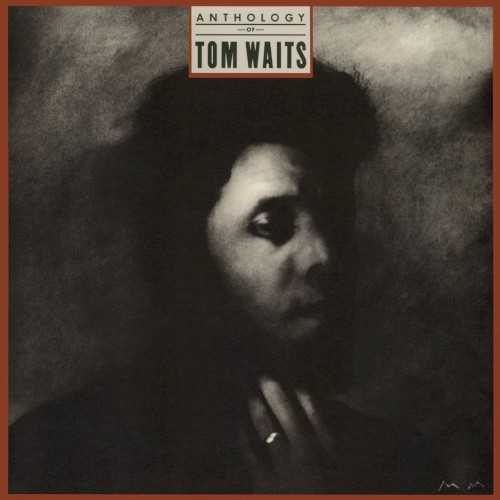 | Album: 27 of 28 Title: Anthology of Tom Waits Released: 2013-10-14 Tracks: 13 Duration: 57:08 Scroll: Up Down Top Bottom 25% 50% 75% Spotify AlbumCover | 1 Ol’ 55 (03:57) 2 Diamonds on My Windshield (03:12) 3 The Heart of Saturday Night (03:53) 4 I Hope That I Don’t Fall in Love With You (03:54) 5 Martha (04:30) 6 Tom Traubert’s Blues (Four Sheets to the Wind in Copenhagen) (06:35) 7 The Piano Has Been Drinking (Not Me) (03:38) 8 I Never Talk to Strangers (03:38) 9 Somewhere (03:52) 10 Burma-Shave (06:34) 11 Jersey Girl (05:10) 12 San Diego Serenade (03:30) 13 A Sight for Sore Eyes (04:40) |
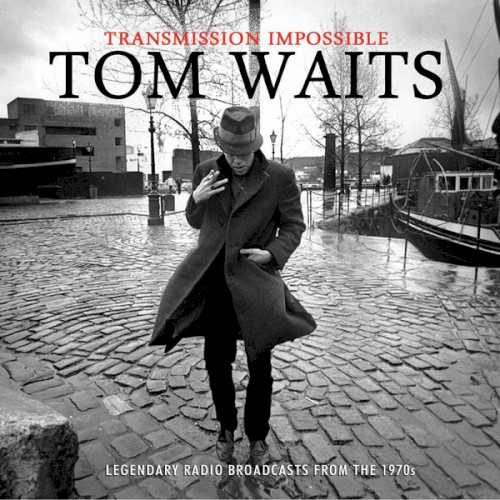 | Album: 28 of 28 Title: Transmission Impossible Released: 2015-03-15 Tracks: 39 Duration: 3:36:54 Scroll: Up Down Top Bottom 25% 50% 75% Allmusic AlbumCover | 1 Emotional Weather Report (Live in Minneapolis 1975) (06:23) 2 Eggs and Sausage (Intro) (Live in Minneapolis 1975) (05:49) 3 Eggs and Sausage (Live in Minneapolis 1975) (03:04) 4 Better off Without a Wife (Live in Minneapolis 1975) (04:46) 5 Semi Suite (Live in Minneapolis 1975) (06:27) 6 Spare Parts (Live in Minneapolis 1975) (08:10) 7 The Ghosts of Saturday / The Heart of Saturday Night (Live in Minneapolis 1975) (08:24) 8 New Coat of Paint (Live in Minneapolis 1975) (02:24) 9 Warm Beer and Cold Women (Live in Minneapolis 1975) (05:47) 10 Virginia Avenue (Live in Minneapolis 1975) (02:47) 11 San Diego Serenade (Live in Minneapolis 1975) (04:26) 12 Putnam County (Live in Minneapolis 1975) (06:38) 13 Ol 55 (Live in Minneapolis 1975) (03:30) 14 Mr. Siegal (Live in Australia 1981) (03:30) 15 Tango Til Theyre Sore (Live in New York 1986) (03:18) 16 Time (Live in New York 1986) (02:20) 1 Emotional Weather Report (Live in New York 1976) (07:40) 2 A Sight for Sore Eyes (Live in New York 1976) (03:20) 3 Step Right Up (Live in New York 1976) (06:45) 4 Eggs and Sausage / Invitation to the Blues (Live in New York 1976) (04:46) 5 Jitterbug Boy (Live in New York 1976) (06:35) 6 Diamonds on My Windshield (Live in New York 1976) (03:59) 7 San Diego Serenade (Live in New York 1976) (04:28) 8 Tom Trauberts Blues (Live in New York 1976) (08:55) 9 New Coat of Paint (Live in New York 1976) (06:01) 10 The Piano Has Been Drinking (Not Me) (Live in New York 1976) (05:12) 11 I Cant Wait to Get off to Work (Live in New York 1976) (04:04) 1 Standin on the Corner (Live in New York 1977) (06:43) 2 I Never Talk to Strangers (Live in New York 1977) (04:00) 3 Pasties and a G-String (Live in New York 1977) (06:29) 4 Invitation to the Blues / Eggs and Sausage (Live in New York 1977) (08:23) 5 Jitterbug Boy (Live in New York 1977) (06:24) 6 Step Right Up (Live in New York 1977) (05:19) 7 I Wish I Was in New Orleans / Small Change (Live in New York 1977) (11:53) 8 The Piano Has Been Drinking (Not Me) (Live in New York 1977) (03:44) 9 Emotional Weather Report (Live in New York 1977) (04:58) 10 Muriel (Live in New York 1977) (05:01) 11 Jack & Neal / California, Here I Come (Live in New York 1977) (06:00) 12 Tom Trauberts Blues (Live in New York 1977) (08:32) |